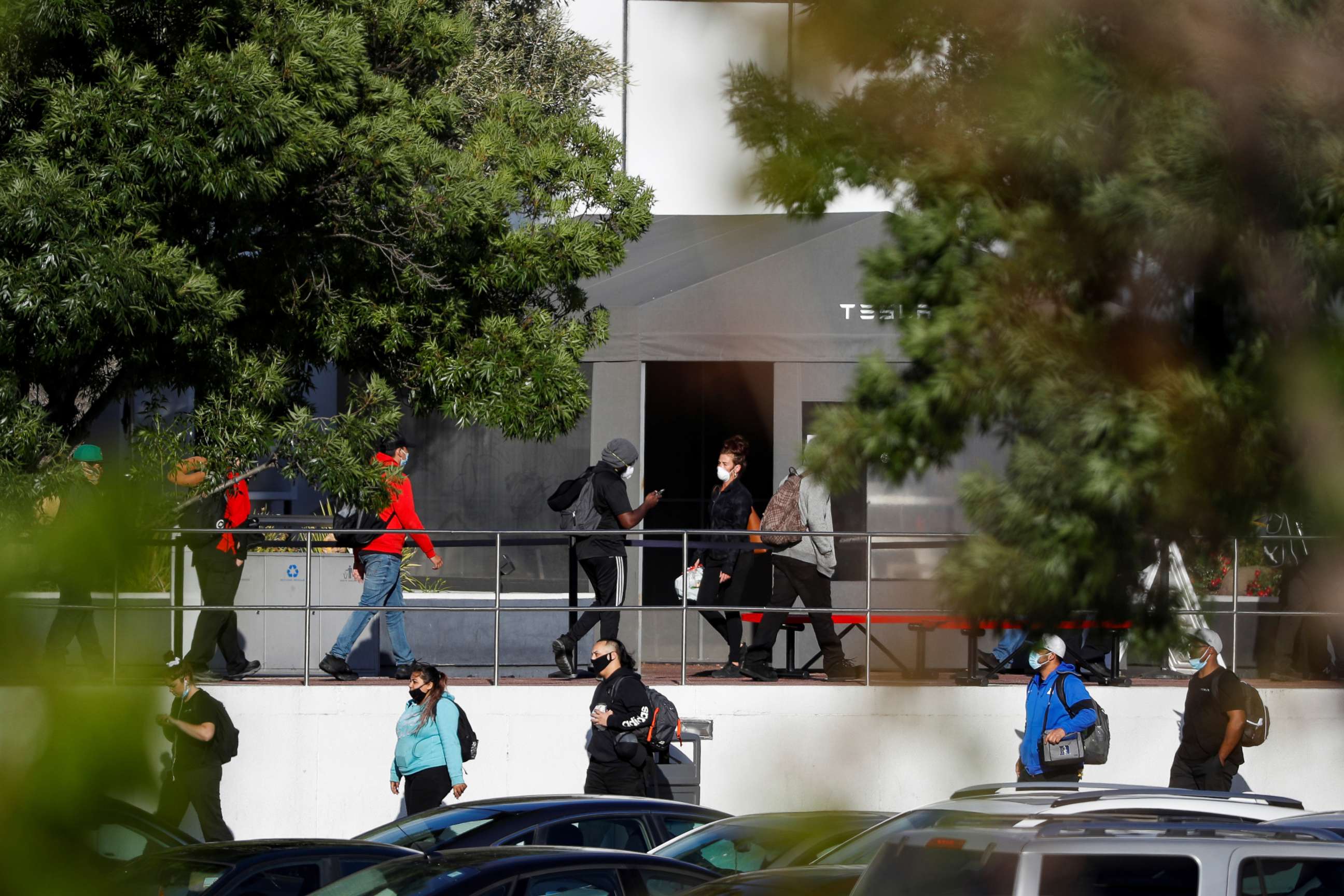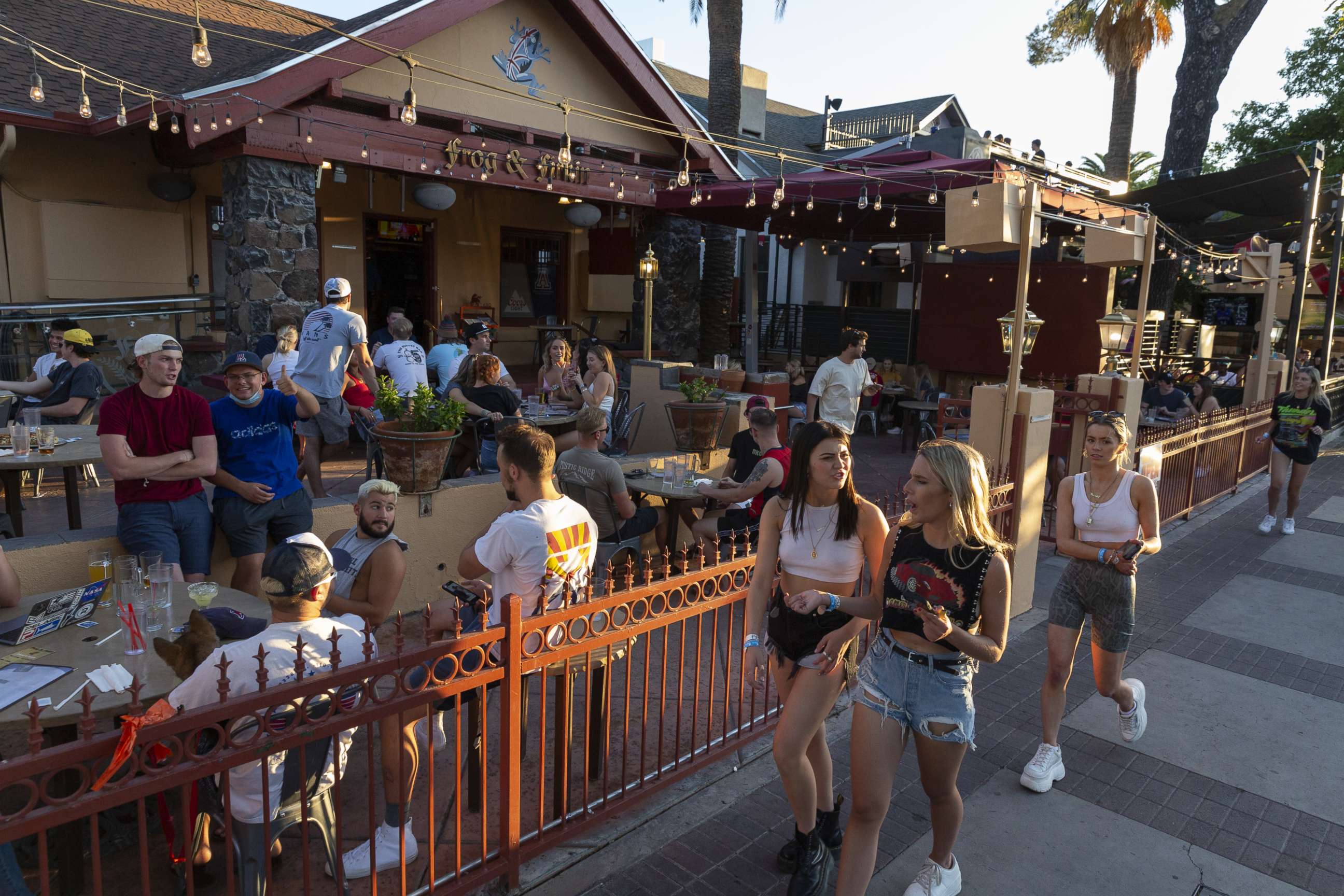Coronavirus contact tracers' nemeses: People who don't answer their phones
Experts say the outreach effort has to be massive, but the public must help.
Massachusetts, praised by public health officials for being one of the first states to set up a coronavirus contact tracing program, is running into a problem: people aren’t picking up their phones.
When investigators reached out to infected residents and those with whom they came into close contact, more than half of their calls were being ignored, health officials revealed in recent a press briefing with Gov. Charlie Baker.
“If you get a call or a text from your local board of health or the COVID Team, it’s vital you take that call,” Baker said at the May 7 news conference, though state officials said the numbers have since improved.
Tune into ABC at 1 p.m. ET and ABC News Live at 4 p.m. ET every weekday for special coverage of the novel coronavirus with the full ABC News team, including the latest news, context and analysis.
Michigan Gov. Gretchen Whitmer said her state has faced the same problem.
"I know a lot of you don't answer the phone when you see an unknown caller reaching in, but I implore you to answer the call if it comes," she said at an April 20 news conference.
Experts have long said that along with robust coronavirus testing, contact tracing -- the detective work of searching backward from a positive coronavirus case for everyone who might've been exposed to it -- on a massive scale is key to a safer reopening of the country.

Starting with people who test positive for COVID-19, tracers, with a series of carefully worded questions, figure out who a person was in contact with a few days before their symptoms started – skillfully reconstructing their schedules from sometimes hazy memories to map out a detailed chain of potential COVID-19 transmission.
They then follow up with that person's close contacts, alerting those who may have been exposed to COVID-19, all without ever revealing the identity of patient zero.
But across the country, the growing number of coronavirus contact tracers are struggling to reach some residents who may have been exposed and, therefore, could be spreading the disease, public health officials in several states told ABC News.
While it’s not clear how many Americans are ignoring contact tracing calls – a Centers for Disease Control and Prevention (CDC) spokesperson said the agency is not gathering data on the subject from the states – any spike in missed connections could delay efforts to quickly notify people and limit the spread of the virus in communities beginning to loosen restrictions, public health officials and experts told ABC News.
“When you miss anyone, and your contact tracing is incomplete, then you are at risk of ongoing transmission,” said Capt. Eric Pevzner, the chief of the CDC's Epidemic Intelligence Service, the country’s premier public health investigation program.

In interviews with ABC News, health officials offered a variety of explanations for why people aren’t answering phone calls from contact tracers, from robocall fatigue to concerns over privacy to a general mistrust of the system.
“It’s a trend we need to watch,” said Dr. Crystal Watson, a senior associate at the Johns Hopkins Center for Health Security, in light of the “truly unprecedented” scale of contact tracing being done.
“It’s going to take a really impressive amount of cooperation and buy-in from the public to do this,” she said.
A consequence of endless robocalls
At a time when Americans are bombarded with more than 58 billion robocalls a year, and fraudsters are using the coronavirus to target potential victims in phone calls and text messages, many people are reluctant to field unexpected calls from unknown numbers.
“We’re hearing more and more from local health departments that have ramped up contact tracing, if citizens, if community members are seeing the Health Department on their phone, they’re really reluctant to provide information,” said Lori Tremmel Freeman, the CEO of the National Association of County and City Health Officials, which represents nearly 3,000 local health departments across the country.
Before the coronavirus pandemic, local health officials performing contact tracing to track down food-borne illness and sexually transmitted disease outbreaks would be responsible for placing calls.
But with many states partnering with private companies and nonprofits to expand their coronavirus contact tracing efforts, some calls are being made from numbers that trace back to local health departments -- meaning the people who may already have been reluctant to answer are more likely to assume it's a robocall, a telemarketer or some other kind of sales pitch.
“We’re in a time in the United States when there’s a ton of spam phone calls,” John Welch of Partners in Health, the nonprofit working with the state on their contact tracing program, said at the press conference with Baker last week. “If they are worried about a scam, have folks call us back.”
To address the problem, Massachusetts is working with telephone companies to make sure their contact tracers are identified as “MA COVID TEAM” on any call in hopes the more official-sounding identification will convince people the call is legitimate.
The state has also launched a public service announcement campaign to promote the effort help residents understand what to expect from a potential phone call.
State health officials told ABC News Friday the outreach, along with some new tracing communication strategies, has recently brought their "connection rates" to above 60%, including 67.9% for May 11. The officials said that through the middle of the week, the state's effort has reached more than 34,000 people -- 18,936 confirmed cases and 15,889 of their contacts.
Some communities wary of giving health investigators personal info
But even if the recipient recognizes a legitimate government entity, sometimes that's a problem too. In some communities, contact-tracing response rates also appear to reflect larger concerns about what health authorities could do with the information they're given.
“In general, people are wary of sharing personal information with strangers or with people from government,” said Dr. Richard Besser, the president and CEO of the Robert Wood Johnson Foundation and former acting director of the CDC.
“Many of the groups that are being hardest hit -- black Americans, Latinos, Native Americans -- have had poor experiences with government officials and many have had poor experience with public health,” said Besser, who also previously served as chief health and medical editor for ABC News.
Freeman, who is in contact with hundreds of counties conducting contact tracing each day, said that communities with large immigrant populations have struggled in some cases to reach undocumented immigrants who have come in contact with people infected with COVID-19.
“Because of some of the fear created already in our country around immigration and legal status, there are some we simply will never reach because they’re fearful that the information will be used to somehow track them" by Immigration and Customs Enforcement, she told ABC News.
In Maryland’s Anne Arundel County outside of Baltimore, public health workers have made community outreach a priority in their contact tracing by adding translators to their staff, and making sure all their informational handouts are available in Spanish.
The county has also increased outreach to African-American and Hispanic community leaders, to help encourage residents to participate, according to Jennifer Schneider, the deputy director of the health department’s bureau of disease prevention and management.
“There is some mistrust, and we battle with that in public health in general, for the communities to trust the government,” she said. “Immigration status is not a requirement for being tested. We just try to get that messaging out as much as we can and often.”
While the county, which has over 2,500 cases of COVID-19, says it has reached roughly 95% of traced contacts, Schneider said they are concerned about that figure rising as the state begins to ease out of its lock-down, and residents begin interacting with more people.
“We may have to pivot our operations to better find those individuals. That is a concern that we do have,” she said.
The emerging role of technology
In some parts of the country, local public health officials are using technology to reach residents who favor other forms of communication over phone calls.
In Chicago, the city launched Chi COVID Coach to allow the health department to communicate directly with Chicago residents via text message, and provide them with resources on testing and symptoms.
“Let’s not make the choice between tech and people, we need both,” Raed Mansour, Director of Innovation at the Chicago Department of Public Health, told ABC News. “In contact tracing, you need to meet people where they are.”
In many places, that has included text messaging for those who are less likely to answer calls.
"Texting is another way we are letting people know they are trying to reach them," Pevznar, the CDC official, told ABC News."We find people tend to be more receptive to text. Text is a valuable tool."
Perhaps most importantly, however, experts also urged for a more robust public awareness campaign to encourage people to participate.
That effort could help address problems some tracers have faced when they finally do successfully get in touch with people.
One of the newer unexpected problems some tracers are seeing is nearly an existential one: a lost sense of time.
Some people have struggled to piece together their schedules, after weeks of stay-at-home orders in certain regions, public health officials told ABC News.
Since your life has been disrupted, you don’t have those things to pin your memory to. People’s days tend to blend together,” said Pevznar.
Then, there are those who make contact tracing exponentially difficult by flouting quarantine measures. Sara Bosse, the health director in California’s rural Madera County, said that her team has checked in on asymptomatic residents infected with COVID-19 who have stopped complying with stay-at-home restrictions.
“As the weather has gotten warmer, we’ve noticed that people want to be outside and go places and do things,” she told ABC News.
Dr. Philip Huang, the director of the Health and Human Services department in Dallas County, Texas, said it's important to get people to understand why they need to isolate and self-quarantine if contacted, even if they don't have symptoms.
"People need to be responsible. It’s actually caring for the community and caring for others – it may be someone's mother or someone’s grandmother," he said. "It does affect us all."
What to know about coronavirus:
- How it started and how to protect yourself: Coronavirus explained
- What to do if you have symptoms: Coronavirus symptoms
- Tracking the spread in the U.S. and worldwide: Coronavirus map
Jay Bhatt, a practicing internist and Aspen Health Innovators Fellow, is an ABC News contributor.



